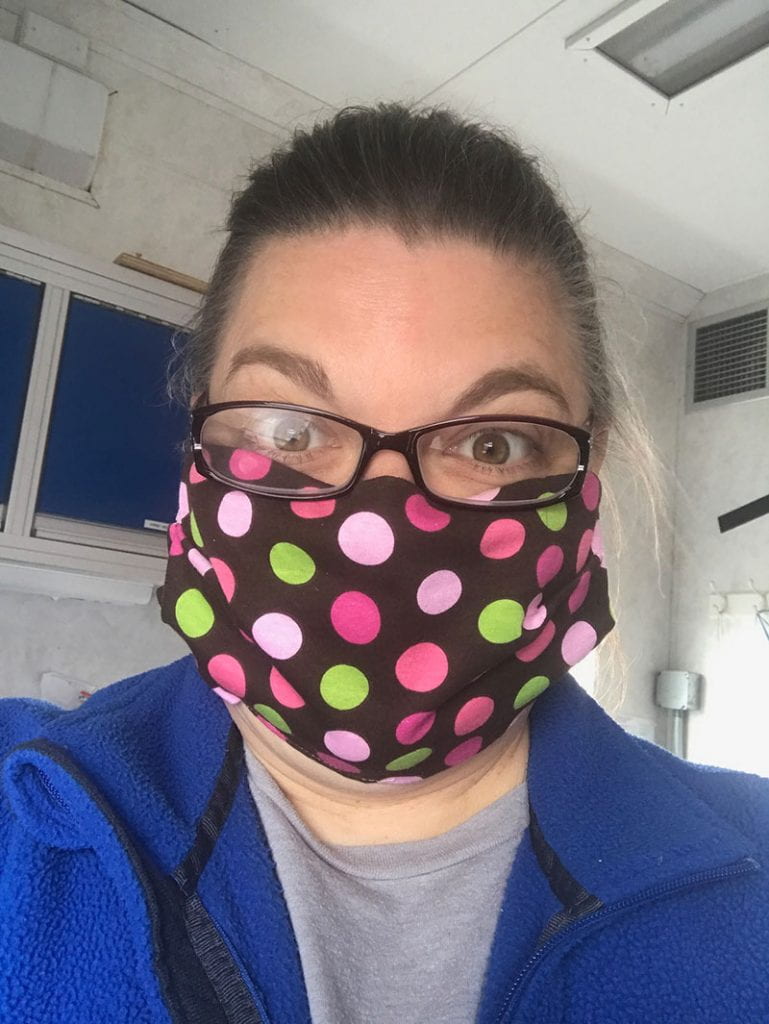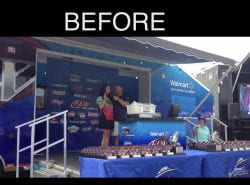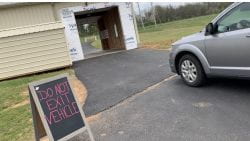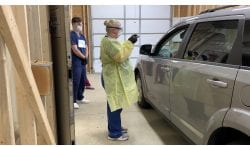Jennie Morehead says she uses the information she learns at the University of Wisconsin-Green Bay every day, even when she’s building a COVID-19 test site. She is currently a student in the Master of Science in Health and Wellness Management program.


Morehead, who lives in Paducah, Kentucky, was working as the executive director of wellness at HealthWorks Medical, LLC when COVID-19 hit. With the pandemic, she wasn’t able to provide that in-person patient care anymore. But when an anonymous donor offered to pay for 1,000 test kits and processing, her company jumped at the chance to be able to provide that service to their community.
Using a church parking lot and outbuilding breezeway, a donated trailer from Fishing League Worldwide (FLW), and $250,000 from their anonymous donor, Morehead and members of a community wide taskforce were able to build the facility in a couple of days, she said. The effort was led by Morehead’s boss, Kyle Turnbo, MD, FAOCM, MPH, MRO.
The testing facility used the breezeway to house the actual testing process. The donor paid for the breezeway to be enclosed by a local contractor, complete with two automatic garage doors, for patients to enter and exit while staying in their vehicle. The FLW fishing trailer with a stage and office allowed staff to safely collect patient data prior to testing.
“When our owner, Dr. (J. Kyle) Turnbo, got that call, he said, ‘Well, we’ll just build our own site,’” she said. “And he made a community task force of our local Baptist hospital and our local Mercy hospital and then he said, ‘Look, I’ve got the tests. We’ve got the staff. We’ll be happy to run it if you all will help us build a site. That way the patients can stay out of the hospital, they can stay out of the doctors’ offices and we test them, and any physician that wanted to order a test could do that and it’s free.’”
Prior to working in corporate wellness, Morehead worked in safety engineering, so she called her construction contacts. Her husband, a retired professional fisherman, called his contacts with the FLW. Using the parking lot and annex building of a local church, they were able to create the testing site in three days.
“So a car can drive in and we shut the door behind them and they can be tested out of the wind out of the elements that we don’t have to worry about cross-contaminating,” she said. Having the testing happen inside also helps with HIPAA regulations, she said.
Morehead said she had just started her studies at UW-Green Bay when the outbreak started, but that she uses what she learns almost daily.
“When I started looking at what the topics were and what the classes were that were offered at the University, it was something I could see practicality in each of those classes that could I could immediately apply back into our work which is what I’m doing now,” she said. “You know, every time I take a class I’m like ‘Oh! I wish I’d known that before I did that program or I wish I’d know that before we developed this.’”
In addition, she said, her professors were great to work with as she managed working and studying at the same time.
“My professors, all of them have been more than kind because I started on March the 10th. And everything went crazy on March 11th. And they’ve been really nice to work with because you can only do so much in the day, and I appreciate their willingness to work with me on when assignments are due.
“I chose UW-Green Bay because I wanted to have an academic degree in wellness as our corporate wellness division is bidding wellness program work on a national platform. We service the majority of the national river industry and now national companies that have locations all over the United States. My first career was in heavy industrial construction occupational safety and health engineering. When bidding work nationally, my CV is often requested by potential clients, and I wanted my academic background to show that I am more than qualified to lead my team in corporate wellness while drawing from my experience as a safety and health engineer. UW-Green Bay was the only school I could find that seemed to offer wellness classes that I could transpose into the non-academic world almost immediately.”
So far, the drive-thru test site has tested more than 930 residents from Kentucky, Tennessee, Missouri and Illinois, she said. All of those tested have been ordered to get tests from their doctors. Now that the free tests are almost gone, the task force will enter phase two of the testing program, closing down and cleaning up the drive-thru testing site, and opening up another one somewhere else.
Instead of the three days it took to bring the drive through site together, the process for closing down and cleaning up the drive-thru site and opening up another testing site is expected to take a little longer – between three and four weeks, Morehead said.
Story by Liz Carey






